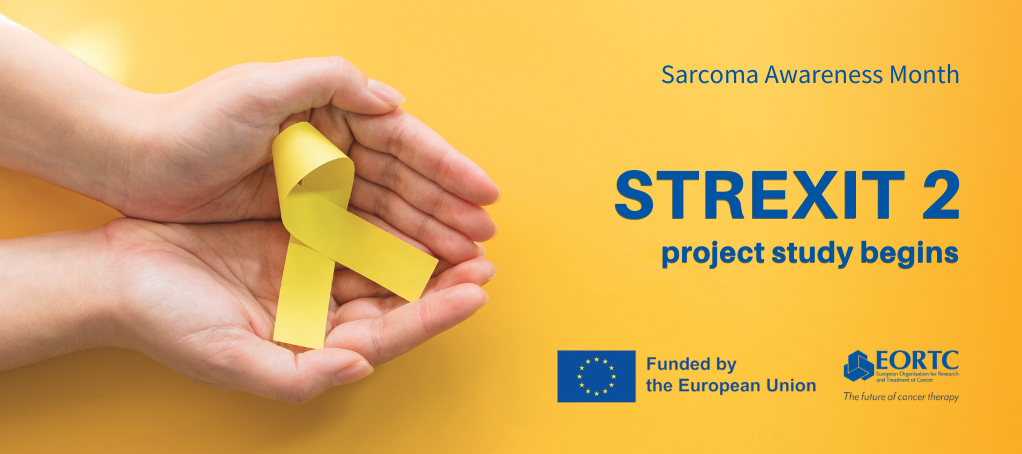Celebrating Sarcoma Awareness Month with the start of EU-funded STREXIT 2 project study
17 Jul 2023
On Sarcoma Awareness Month, the European Organisation for Research and Treatment of Cancer (EORTC) and the Syreon Research Institute are delighted to announce the official start of STREXIT 2, an observational arm of the EORTC 1809 STRASS 2 clinical trial focusing on high-risk retroperitoneal sarcoma.
STREXIT 2 is one of three research projects coordinated by the EORTC, alongside DE-ESCALATE and LEGATO, which have recently received funding from the EU Horizon programme. The study will span over a duration of five years.
About Retroperitoneal Sarcomas
Sarcomas are a rare and aggressive form of cancer that affects the body’s soft tissues. Specifically, retroperitoneal sarcomas impact the abdomen and constitute 15% of all soft-tissue sarcomas. Retroperitoneal sarcoma is an extremely rare and aggressive tumour occurring in 0.5 to 1.0 per 100,000 individuals in the population. Its diagnosis is challenging, and treatment proves difficult. Certain subtypes, such as high-grade dedifferentiated liposarcoma and leiomyosarcoma, present particularly high risks, with a 70% mortality rate five years after treatment. There is a clear need for new and better treatments for retroperitoneal sarcoma, which is generally treated with just surgery alone.
About STRASS 2/STREXIT 2
STRASS 2 is a multicentre, open-label phase III international clinical trial that investigates treatment options (neoadjuvant chemotherapy followed by surgery versus surgery alone) for patients with high-risk retroperitoneal sarcoma (RPS). This is the first official trial looking into the potential benefits of chemotherapy before surgery to improve disease control and survival in patients burdened by this rare cancer.
In June 2023, work on the set-up of a new observational arm called STREXIT 2 officially started. This arm will be added to the ongoing STRASS 2 clinical trial to gather real-world data from patients who do not meet the eligibility criteria for STRASS 2. The objective is to compare the clinical outcomes between STRASS 2 and STREXIT 2 and to explore the possible combination of STRASS 2 and matched STREXIT 2 patients. This will strengthen the results obtained from the randomised clinical trial data and increase the power of subgroup analyses.
The early incorporation of real-world data (STREXIT 2) into the trial (STRASS 2) will enrich the study population and provide a pragmatic approach to addressing crucial causal questions within a rare cancer population.
A positive outcome of the trial will help to understand the clinical added value and cost-effectiveness of neoadjuvant chemotherapy before surgery for high-risk retroperitoneal sarcoma. To determine the latter, a health economics analysis will be performed assessing the economic value of different treatment scenarios based on STRASS 2 and STREXIT 2.
The STRASS 2/STREXIT 2 study will run in 11 countries in Europe, including Cyprus, the Czech Republic, Denmark, France, Germany, Italy, the Netherlands, Poland, Slovakia, Spain, and the UK. Moreover, intergroup collaborations have been set in place with Canada (Canadian Cancer Trials Group), Australia (Australian and New Zealand Sarcoma), and the United States (ECOG-ACRIN Cancer Research Group). STRASS 2 aims to recruit 250 patients in total.
The STRASS 2/STREXIT 2 study provides a unique opportunity to study the optimal treatment for retroperitoneal sarcoma patients with the possibility of changing clinical practice. This could lead to improved patient survival and quality of life but also improve health system sustainability. This is a multidisciplinary and multistakeholder consortium involving clinical oncologists, surgeons, health economists and patient representatives.
Learn more about EORTC 1809 – STRASS 2/ STREXIT 2 here.
Related News
Meet the new EORTC Board
9 Jul 2024
We are pleased to announce the release of the EORTC 2023 Annual Report
17 Jun 2024
Dr Denis Lacombe, EORTC CEO, appointed stakeholder co-chair of ACT EU advisory group
24 May 2024
Clinical Trials Day 2024: a Q&A on pragmatic clinical trials
20 May 2024
EORTC/EMA workshop suggests an international way forward for treatment optimisation studies
8 May 2024
EORTC’s Participation at the ESTRO Congress 2024
29 Apr 2024
EORTC: Advancing research and treatment for rare cancers
29 Feb 2024
EORTC Fellowship Programme: celebrating more than 20 years of impactful collaboration
22 Feb 2024
Appointment of Malte Peters as EORTC Strategic Alliance Officer
9 Feb 2024
Unique series of workshops in partnership with the European Medicines Agency (EMA)
7 Feb 2024


